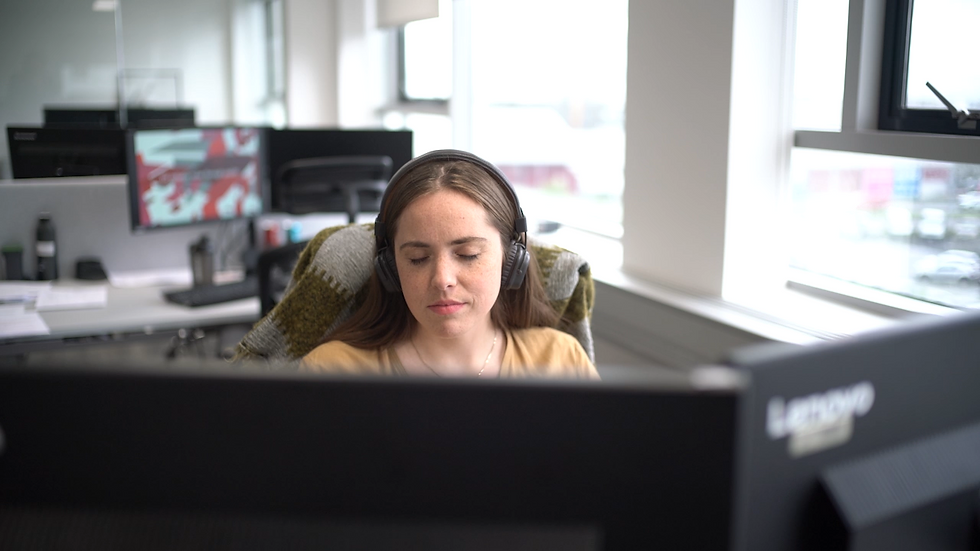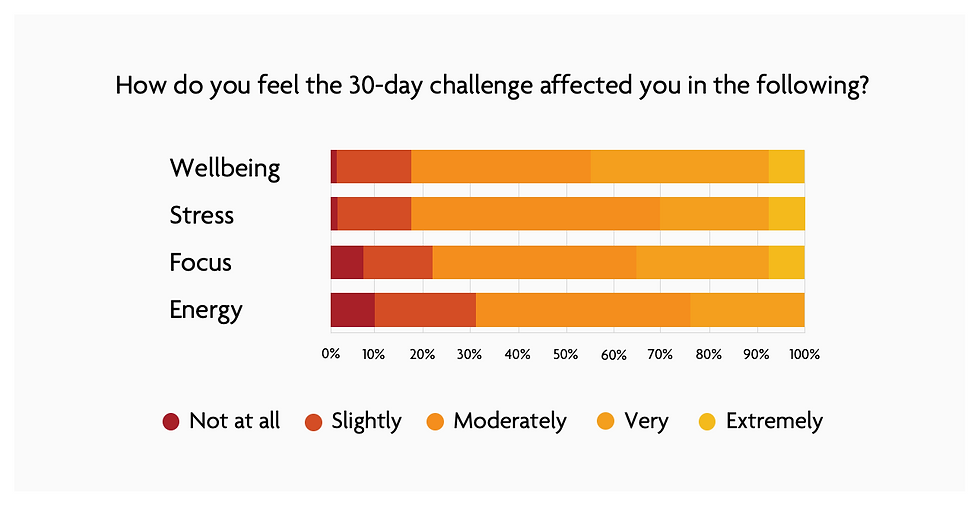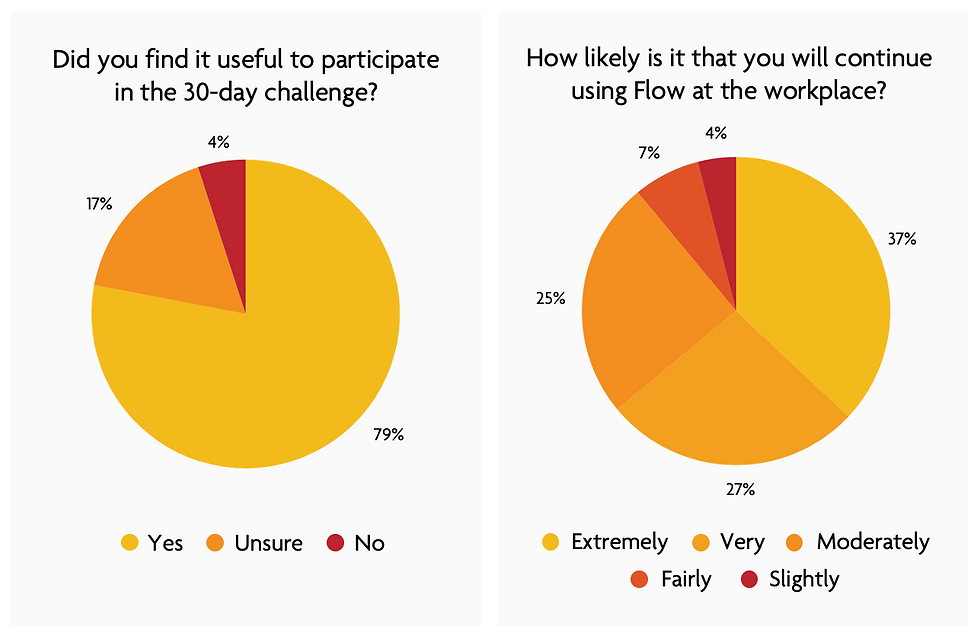Case study: How Flow Helped PwC Iceland Reduce Employee Stress and Enhance Wellbeing
- Flow Team

- Feb 8, 2022
- 5 min read
Updated: Feb 10, 2022
Designed to introduce meditation to employees in the corporate setting, Flow at work aims to help workplaces enhance employee wellbeing while reducing stress, increasing focus and providing other meditation-related benefits. PwC Iceland recently participated in a Flow 30-day meditation challenge, to see just how Flow at work could help its employees thrive. Here’s what we found.
The 30-day Meditation Challenge
PwC Iceland has been a subscriber of the Flow at work wellness program since multiple months back, and the relations to HR manager Katrín Ingibergsdóttir has over time grown strong.

Flow stood out to PwC for a few reasons, but primarily, Katrín and her team loved that Flow provides employees with multiple mediums for their meditation sessions. The app, the web portal and VR headset are all available to employees, giving them an effective meditation practice in whatever way works best for them — and that’s something that Katrín says she couldn’t find with any other provider. As the Wellness Council at PwC started planning an initiative to boost the wellbeing in the workplace, Flow was asked for support. Fruitful conversations brought about what came to be called the 30-day challenge.
Background to the Challenge
Going into this challenge, we knew that PwC Iceland’s employees were dealing with a fast-paced work environment, a lot of competition, and substantial pressure to excel — all things that can cause high stress for employees. No matter the industry, we see employees in these types of environments suffer on many occasions, unless something proactive is done to protect those employees’ mental health. Our aim with the 30-day meditation challenge was to help PwC take that proactive next step for its employees, helping the brand’s teams to better approach their stress management, while building resilience through meditation.
How the Challenge Was Set Up
Multiple PwC offices all across Iceland were in on the 30-day challenge, and as much as 80% of the employees chose to participate. Employees were divided into 11 teams and challenged to meditate as much as possible during a 30-day span across November and December 2021. The team leaders were responsible for encouraging and motivating their team. The teams kept in contact by face-to-face communication as well as chats online. Some offices reported setting up specific areas for meditation, with comfortable places to sit, however still allowing people to meditate anywhere they wanted to.

All employees were given access to Flow’s full suite of meditation tools, including the VR, mobile and web portal meditation platforms (with the exception of a couple of offices that unfortunately did not have access to the VR headsets). Employees could use any of the mediums for meditating during the challenge. Flow-founder Tristan Elizabeth Gribbin held a kick-off workshop to re-introduce participants to the tools and get the challenge started.
Going into the challenge, the majority of participants said they were familiar with meditation or had meditated at some point, though the large majority had also never tried a meditation app before — still, we were optimistic that they would enjoy the Flow experience.
How the Results Were Collected and Analysed
At the end of the 30-day challenge, more than 40 respondents who had participated took an online survey, in which they reported back to us regarding their experiences with Flow. A third-party, independent contractor, Sjá, conducted both the surveys and interviewed the 11 team leaders to learn more about their experiences with Flow on a more personal level.
The Impact of the Challenge
About 30 days and 5000 minutes in meditation later - what are the findings?

Goal-Setting and Approach to the Challenge
Going into the challenge, the participants had reported that they were most interested in using meditation to reduce stress, while increasing focus and productivity, while likewise relaxing and recharging. However, while most employees shared these goals, they all seemed to go about achieving them in different ways. Some employees meditated first thing during the day. Others meditated on their lunch breaks. Others preferred to meditate in the afternoon, as a kind of pick-me-up during the work day.
All the meditation tools were used among the employees. The mobile app was the most used, and proved especially useful for those employees who wanted to continue meditating with Flow outside of their PwC office. The VR app was however the preferred tool to use, as the empoyees described it as being more of an experience, fun to use, and most effective.
The Impact on the PwC Workplace
At the end of the 30 days, employees reported that they felt it had become much more culturally acceptable to meditate at work, whereas, prior to the challenge, it wasn’t considered part of their cultural norm. Most participants also agreed that it now felt as if there was a greater sense of team spirit among the challenge participants, and that it was a huge positive to now feel like they could take a meditation break in the middle of their work days.

The Impact on the PwC Employees
But beyond the simple improvement that employees now felt meditation was more acceptable at work, how did the act of meditation positively impact their well being and mental health, on a personal level?
Nearly the entirety of challenge participants reported feeling “different” after their meditation practice, with more than half saying that the difference was significant or even extreme. They reported feeling calm, more positive and more capable of changing their mindsets than they had felt prior to taking their meditation break. They also identified benefits of the meditation challenge that included greater well-being, less stress, greater energy and improved performance. Others reported that the simple fact that meditating was available to them during the workday was a healthy reminder of the importance of taking breaks while at work.

Beyond the individual impacts, the challenge-nature of the meditation exercise also provided benefits to PwC employees in their 11 individual groups. The groups reported that, at the end of the challenge, they felt a greater sense of team spirit, increased empathy for their colleagues and more cohesion on their teams. They likewise said they appreciated that the meditation challenge gave them a fun way to interact with their coworkers, outside of their normal day-to-day routines.
Feedback on Flow and the Challenge
Beyond the benefits that PwC employees found thanks to the meditation, how did they feel about Flow and the challenge?
Nearly 80% of the participants said the overall challenge was useful (see figure 2), while 85% called the challenge moderately to extremely successful. Nearly 90% said they’re also moderately to extremely likely to continue using Flow if PwC continues to offer it as a benefit to employees (see figure 3). About 70% of participants said they would use Flow on a weekly basis or more frequently, if the workplace continues to provide it.

While the majority of participants used the Flow app most often, the VR platform was still the reported favourite, as participants liked the immersive, fun, and impactful experience. Some said they would even use Flow at home, on their personal VR devices, if possible. Other things they enjoyed about the VR platform was the Icelandic language option, as well as the graphics and music.
76% of the participants rated Flow as “easy” to use and the average score for user interface was 8.06 (see figure 4). The complaints? Participants said they wished the log-in process for using Flow was easier. The average rating for Flow's meditation content was 7.79 (see figure 4), with the respondents stating that they loved the content, but wished there was more of it available.

Could Flow Help Your Employees to Train Their Minds Too?
PwC employees largely reported reduced stress, increased energy and greater overall wellbeing when using Flow in the workplace. Additionally, beyond the individual benefits, they likewise reported greater sense of community among their teams when multiple individuals were actively using Flow over the same time period. Could your team see the same benefits?
Check out the Flow at work program and find out for yourself why leading companies like PwC Iceland, Vodafone Iceland, and Kolibri are choosing to give their employees the many benefits of meditation in the workplace.





PDC Electric continues to set industry standards through quality, innovation, and customer commitment. https://pdcelectric.com/ UL-certified control panels, robotics solutions, and power systems represent the perfect blend of engineering and craftsmanship. Supported by a talented and dedicated team, they remain a trusted partner in powering industrial progress worldwide.
Get Kristen Bell’s look with the Nobody Wants This S2 Blue Sweatshirt – cozy, stylish, and iconic. Stay comfy in the Nobody Wants This Season 2 Kristen Bell Blue Sweatshirt – celebrity-inspired style. Shop the viral Nobody Wants This S2 Kristen Bell Blue Sweatshirt – soft, bold, and effortlessly cool. Recreate Kristen Bell’s look with the exclusive Blue Sweatshirt from Nobody Wants This Season 2.
Ready for the cold? Jackettrend has the season’s hottest jackets waiting for you. Upgrade your winter look with Jackettrend’s premium coats and jackets. Find your perfect jacket for every season at Jackettrend’s online store. Summer or winter, Jackettrend keeps your style fresh all year long.
Steamunlocked builds excitement around new releases.
Commercial garage door problems require professional attention, and GoPro Garage Door Repair provides exactly that. The garage door repair fairfield ca trained team responds quickly, diagnosing and repairing all components efficiently. They also offer expert installations that meet strict safety and performance standards. GoPro’s focus on reliability, quality, and customer satisfaction makes them the go-to name in garage door services.